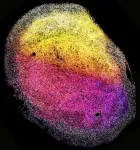(Press-News.org) The joint funding program of the French National Research Agency (ANR) and the German Research Foundation (DFG) promotes Franco-German cooperation in the natural sciences, the life sciences, and the engineering sciences. Through this program, Johannes Gutenberg University Mainz (JGU) will receive support for two distinctive projects in the field of biology.
The EVOMET project: Uncovering the evolution of metabolism in plants
Tomatoes, cucumbers, and potatoes taste different due to the accumulation of different metabolic products in each plant. Plants have the ability to develop new metabolic pathways, but the reasons and mechanisms behind these changes are not yet fully understood. Professor Shuqing Xu from the Institute of Organismic and Molecular Evolution at Mainz University and Professor Emmanuel Gaquerel from the University of Strasbourg will investigate this question together. "For this project, our expertise complements each other perfectly. Our French partner specializes in decoding plant metabolisms, while we have the expertise in evolutionary genetics and genomics," emphasized Shuqing Xu. Both areas of expertise are necessary to study the evolution of metabolic processes in plants.
The Franco-German research group will focus on the evolution of metabolic products in the Solanaceae or nightshade plants, a family that includes potatoes, tomatoes, tobacco, and petunias. Their aim is to identify the natural genetic adaptations that are responsible for the differences in the plants' metabolisms. The researchers will also be looking at aspects such as whether the modifications of a few enzymes are sufficient to create novel metabolites that can protect plants against pests or give them a pungent flavor. Furthermore, the group will determine the evolutionary forces and the environmental factors responsible for the diversity of plant metabolites. There are a number of metabolic intermediates that are generated during the biosynthesis of certain defense chemicals that can result in autotoxicity. This means that if excessive levels of these intermediates accumulate in a plant, this can inhibit its growth and development. One way plants often use to prevent autotoxicity is to modify these intermediates by attaching sugar molecules to them. The researchers hypothesize that the avoidance of autotoxicity might also be one of the reasons why there is so much diversity in plant metabolism. "The results of our studies will provide new insights into the evolution of plant metabolism and expand the options for the metabolic engineering of plants, one of the key areas of green biotechnology," concluded Xu.
The NeuroDevFunc project: Discovering how fruit flies process visual motion generated by self-movement
Our eyes are constantly busy with processing information on movement. We perceive movement not only when an object is in motion, such as when someone kicks a ball towards us, but also when we ourselves run across a soccer field and our surroundings appear to move relative to us. This is basically the same for the fruit fly Drosophila melanogaster, which can both fly and walk. The information gathered by the fly's eyes needs to be transmitted rapidly to the nervous system to enable the observer to avoid obstacles. T4 and T5 cells are involved here. They are located just a few cell layers below the photoreceptors and detect the direction of movements. Professor Marion Silies of JGU has been investigating how these cells process motion information for several years. "There have been many studies to date that used anatomical, genetic, and functional approaches to discover how this happens. All have come to the conclusion that there are four types of direction-selective cells in the eyes of fruit flies – one each for upward and downward motion, and one each for motion left and right," explained Silies. "However, in a preliminary study in which we examined the whole population of these T4/T5 cells, we were able to demonstrate that, in fact, there are six different types of these neurons. These do not simply encode, as has been assumed, invariable movement directions but together capture the global motion patterns that are generated by the movements of the flies themselves. These results represent a radical shift in the way that the neurobiology of visual motion processing is working."
Dr. Bassem Hassan working at the Institut du Cerveau in Paris has reported complementary findings. The biologist was studying the division pattern of neuronal stem cells and discovered that more than four motion-sensitive neurons were generated during development, thus also contradicting the then prevailing view of the scientific community. "Our results correlate so closely that we intend to combine developmental biology with our investigations of the functional aspects," said Silies. The Franco-German team plans to investigate various topics, one of which will involve establishing how the development and functioning of these cells are linked. In addition, they will be looking at how the subtypes of these direction-selective cells generate various types of behavior. This cross-border research project is to be financed through the ANR-DFG program for three years.
Related links:
https://www.blogs.uni-mainz.de/fb10-biologie-eng/ – Faculty of Biology at Johannes Gutenberg University Mainz
https://iome.biology.uni-mainz.de/ – Institute of Organismic and Molecular Evolution (IOME) at the JGU Faculty of Biology
https://idn.biologie.uni-mainz.de/ – Institute of Developmental Biology and Neurobiology (IDN) at the JGU Faculty of Biology
:
https://press.uni-mainz.de/shuqing-xu-receives-erc-consolidator-grant-for-his-research-on-the-evolution-in-ecological-communities-in-response-to-climate-change/ – press release "Shuqing Xu receives ERC Consolidator Grant for his research on the evolution in ecological communities in response to climate change" (5 Dec. 2023)
https://press.uni-mainz.de/marion-silies-receives-erc-consolidator-grant-for-research-on-adaptive-functions-of-visual-systems/ – press release "Marion Silies receives ERC Consolidator Grant for research on adaptive functions of visual systems" (4 Apr. 2022)
https://press.uni-mainz.de/local-motion-detectors-in-fruit-flies-sense-complex-patterns-generated-by-their-own-motion/ – press release "Local motion detectors in fruit flies sense complex patterns generated by their own motion" (5 Apr. 2022)
https://press.uni-mainz.de/fruit-flies-respond-to-rapid-changes-in-the-visual-environment-thanks-to-luminance-sensitive-lamina-neurons/ – press release "Fruit flies respond to rapid changes in the visual environment thanks to luminance-sensitive lamina neurons" (5 Feb. 2020)
https://www.magazine.uni-mainz.de/how-flies-and-humans-see-the-world/ – JGU Magazine: "How flies and humans see the world" (14 Jan. 2020) END
Franco-German research funding in the field of biology
Researchers at the Faculty of Biology at Mainz University and their French partners receive financing from ANR and DFG for joint projects
2024-01-08
ELSE PRESS RELEASES FROM THIS DATE:
Fastest swimming insect could inspire uncrewed boat designs
2024-01-08
ITHACA, N.Y. – Whirligig beetles, the world’s fastest-swimming insect, achieve surprising speeds by employing a strategy shared by speedy marine mammals and waterfowl, according to a new Cornell University study that rewrites previous explanations of the physics involved.
The centimeter-long beetles can reach a peak acceleration of 100 meters per second and a top velocity of 100 body lengths per second (or one meter per second).
Not only do the results explain the whirligig’s Olympian speeds, but they also offer valuable insights for bio-inspired designers of near-surface water robots and uncrewed boats.
Until ...
Why do we sleep? Researchers propose an answer to this age-old question
2024-01-08
Sleep is a fundamental need, just like food or water. “You’ll die without it,” said Keith Hengen, an assistant professor of biology at Washington University in St. Louis. But what does sleep actually accomplish? For years, the best researchers could say is that sleep reduces sleepiness — hardly a satisfying explanation for a basic requirement of life.
But by melding concepts from the fields of physics and biology, Hengen and a team of Arts & Sciences researchers have constructed a theory that could explain both the meaning of sleep and the complexity of the brain. As reported in a new study published ...
Singh studying distributed computing models and algorithms for pervasive systems
2024-01-08
Gurdip Singh, Divisional Dean, School of Computing, received funding from the National Science Foundation for the project: "EAGER: Distributed Computing Models and Algorithms for Pervasive Systems."
The goal of this project is to extend the traditional graph-based distributed computing models and algorithms to develop a unified model to study cyber-physical systems. The unified models will capture interactions between the physical and cyber entities and the physical phenomena. This project also proposes to develop techniques to design distributed algorithms for fundamental problems ...
Narayanan developing treatments for alphaviruses
2024-01-08
Aarthi Narayanan, Professor, Biology, received funding for the project: "Further the development of Omaveloxolone and Bardoxolone methyl as broadly effective countermeasures against alphaviruses to Support the Battelle Accelerated Therapeutics for Combating Acute Viral Epidemics (BAT-CAVE) Program."
The principal purpose of this program is to conduct Research and Development into medical, pharmaceutical, and diagnostic technologies to enhance mission effectiveness of military personnel, collaborating ...
SwRI awarded $54 million contract to develop QuickSounder weather satellite
2024-01-08
SAN ANTONIO — January 8, 2024 —NASA and NOAA have selected Southwest Research Institute (SwRI) to develop QuickSounder, the first in a new generation of NOAA low-Earth orbit environmental satellites. Under the $54 million contract, SwRI will design and build the satellite and operate it for three years.
QuickSounder will kick off NOAA’s Near Earth Orbit Network (NEON) program. The Near Earth Orbit Network is a collaborative mission between NASA and NOAA. NASA will manage the development and launch of the satellites for NOAA, which will operate them and deliver data to users worldwide. NEON satellites ...
Novel tissue-derived brain organoids could revolutionize brain research
2024-01-08
Press release – Princess Máxima Center for pediatric oncology
EMBARGO: 8 JANUARY 2024 AT 11:00 AM ET (US)
Scientists have developed 3D mini-organs from human fetal brain tissue that self-organize in vitro. These lab-grown organoids open up a brand-new way of studying how the brain develops. They also offer a valuable means to study the development and treatment of diseases related to brain development, including brain tumors.
Scientists use different ways to model the biology of healthy tissue and disease in the lab. These include cell lines, laboratory animals and, since a few years, 3D mini-organs. ...
SARS-CoV-2 BA.2.86 is less resistant to vaccine, but may be a problem in the lung
2024-01-08
COLUMBUS, Ohio – New research shows that the recently emerged BA.2.86 omicron subvariant of the virus that causes COVID-19 can be neutralized by bivalent mRNA vaccine-induced antibodies in the blood, which explains why this variant did not cause a widespread surge as previously feared.
However, the study in cell cultures showed this SARS-CoV-2 variant can infect human cells that line the lower lung and engage in virus-host cell membrane fusion more efficiently, two features linked to severe disease symptoms.
The study is published today (Jan. 8, 2024) in the journal Cell.
The BA.2.86 variant of omicron is the ancestor of the currently dominating JN.1 and has about ...
Sibling death in childhood and early adulthood and risk of early-onset cardiovascular disease
2024-01-08
About The Study: In this study of more than 2 million individuals born in Denmark, sibling death in childhood and early adulthood was associated with increased risks of overall and most type-specific early-onset cardiovascular diseases, with the strength of associations varying by cause of death and age difference between sibling pairs. The findings highlight the need for extra attention and support to the bereaved siblings to reduce cardiovascular disease risk later in life.
Authors: Guoyou Qin, Ph.D., and Yongfu Yu, Ph.D., ...
Early-life digital media experiences and development of atypical sensory processing
2024-01-08
About The Study: Early-life digital media exposure was associated with atypical sensory processing outcomes in multiple domains in this study that included 1,471 children. These findings suggest that digital media exposure might be a potential risk factor for the development of atypical sensory profiles. Further research is needed to understand the relationship between screen time and specific sensory-related developmental and behavioral outcomes, and whether minimizing early-life exposure can improve subsequent sensory-related outcomes.
Authors: Karen F. Heffler, M.D., of the Drexel University ...
Diagnostic errors in hospitalized adults who died or were transferred to intensive care
2024-01-08
About The Study: Diagnostic errors in hospitalized adults who died or were transferred to the intensive care unit were common and associated with patient harm in this analysis of 2,428 patient records at 29 hospitals. Problems with choosing and interpreting tests and the processes involved with clinician assessment are high-priority areas for improvement efforts.
Authors: Andrew D. Auerbach, M.D., M.P.H., of the University of California, San Francisco, is the corresponding author.
To access the embargoed study: Visit ...
LAST 30 PRESS RELEASES:
Bacteria frozen in ancient underground ice cave found to be resistant against 10 modern antibiotics
Rhododendron-derived drugs now made by bacteria
Admissions for child maltreatment decreased during first phase of COVID-19 pandemic, but ICU admissions increased later
Power in motion: transforming energy harvesting with gyroscopes
Ketamine high NOT related to treatment success for people with alcohol problems, study finds
1 in 6 Medicare beneficiaries depend on telehealth for key medical care
Maps can encourage home radon testing in the right settings
Exploring the link between hearing loss and cognitive decline
Machine learning tool can predict serious transplant complications months earlier
Prevalence of over-the-counter and prescription medication use in the US
US child mental health care need, unmet needs, and difficulty accessing services
Incidental rotator cuff abnormalities on magnetic resonance imaging
Sensing local fibers in pancreatic tumors, cancer cells ‘choose’ to either grow or tolerate treatment
Barriers to mental health care leave many children behind, new data cautions
Cancer and inflammation: immunologic interplay, translational advances, and clinical strategies
Bioactive polyphenolic compounds and in vitro anti-degenerative property-based pharmacological propensities of some promising germplasms of Amaranthus hypochondriacus L.
AI-powered companionship: PolyU interfaculty scholar harnesses music and empathetic speech in robots to combat loneliness
Antarctica sits above Earth’s strongest “gravity hole.” Now we know how it got that way
Haircare products made with botanicals protects strands, adds shine
Enhanced pulmonary nodule detection and classification using artificial intelligence on LIDC-IDRI data
Using NBA, study finds that pay differences among top performers can erode cooperation
Korea University, Stanford University, and IESGA launch Water Sustainability Index to combat ESG greenwashing
Molecular glue discovery: large scale instead of lucky strike
Insulin resistance predictor highlights cancer connection
Explaining next-generation solar cells
Slippery ions create a smoother path to blue energy
Magnetic resonance imaging opens the door to better treatments for underdiagnosed atypical Parkinsonisms
National poll finds gaps in community preparedness for teen cardiac emergencies
One strategy to block both drug-resistant bacteria and influenza: new broad-spectrum infection prevention approach validated
Survey: 3 in 4 skip physical therapy homework, stunting progress
[Press-News.org] Franco-German research funding in the field of biologyResearchers at the Faculty of Biology at Mainz University and their French partners receive financing from ANR and DFG for joint projects



